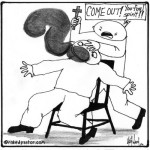We run our website the way we wished the whole internet worked: we provide high quality original content with no ads. We are funded solely by your direct support. Please consider supporting this project.
What is the significance of 1 Samuel 13:13–14?
Because of Saul’s rebellion, Samuel tells him, “The Lord would have established your kingdom over Israel forever but now your kingdom will not continue.”
The biblical narrative depicting God’s dealings with Saul up to this point is predicated on the assumption that God intended to establish Saul’s descendants as the permanent heir to the throne of Israel. He would have followed through with this if Saul had not fallen. If the classical view of divine foreknowledge is correct, however, God couldn’t really have planned on permanently establishing Saul’s throne, for he would have eternally foreknown that this wouldn’t happen.
Category: Q&A
Tags: Open Theism, Q&A
Topics: Open Theism
Verse: 1 Samuel 13
Related Reading

Revelation 17:8 refers to people whose names haven’t been written in “the book of life from the creation of the world.” Doesn’t this conflict with open theism?
As in Revelation 13:8, the clause “from the foundation” (apo kataboleis) need not mean “from before the foundation” but simply “from the foundation” (= since the foundation). It’s not that names either were or were not written in the “book of life” before they were ever born. Rather, throughout history, in response to the choices…

How Much of the Future is Settled? How Much is Open? (podcast)
Greg considers the mathematical nature of determinacy. Episode 566 http://traffic.libsyn.com/askgregboyd/Episode_0566.mp3

What is the significance of Jeremiah 42:9-16?
Through Jeremiah the Lord tells Israel “If you stay in this land, I will build you up and not tear you down; I will plant you and not uproot you, for I have relented concerning the disaster I have inflicted on you” (vs. 10). Then, a few verses later, he says, “However, if you say,…

Changing Beliefs
Stephen Mattson is a follower of ReKnew and a member of Woodland Hills Church who posted a piece on Sojourners titled Christians: It’s NOT a Sin to Change Your Beliefs. He points out that doubt and questions are a natural and needed part of any Christian’s life, and our community needs to change the ways we…

What is the significance of Jeremiah 3:19–20?
“I thought how I would set you among my children…And I thought you would call me, My Father, and would not turn from following me. Instead, as a faithless wife…you have been faithless to me…” If the future is eternally and exhaustively settled, and if God therefore knows it as such, he could not have…

